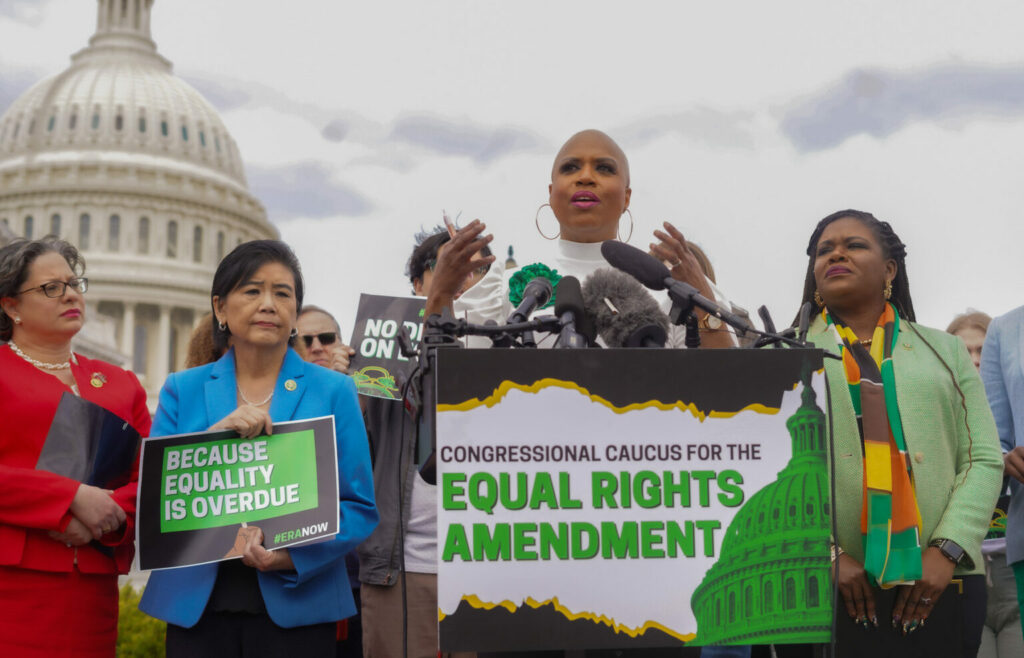Reps. Cori Bush and Ayanna Pressley Launch Congressional ERA Caucus—’Because Equality Is Overdue’

On Tuesday, exactly 100 years after the Equal Rights Amendment (ERA) was first introduced in Congress, members of the House of Representatives launched the first-ever Congressional Caucus for the Equal Rights Amendment.
The initiative was spearheaded by Reps. Cori Bush (D-Mo.) and Ayanna Pressley (D-Mass.), who were joined by Reps. Nanette Barragán (D-Calif.), Judy Chu (D-Calif.), Madeline Dean, (D-Pa.), Lois Frankel (D-Fla.), Steven Horsford (D-Nev.), Sydney Kamlager-Dove (D-Calif.), Barbara Lee (D-Calif.), Summer Lee (D-Pa.), Jennifer McClellan (D-Va.), Mark Pocan (D-Wis.), Delia Ramirez (D-Ill.), Jamie Raskin (D-Md.) and Abigail Spanberger (D-Va.).
“For far too long, women and LGBTQ+ folks have been relegated to second-class legal status in America—our contributions ignored, erased or rendered a footnote in history—and it’s high time we change that,” said Pressley. “Congressional intent is powerful and congressional caucuses are powerful. It’s long past time we codify the dignity and humanity of all.”
“Through this caucus, we will make sure constitutional gender equality is a national priority,” said Bush, “and that we continue to honor the long legacy of women and activists, especially Black women leaders, to build an inclusive multi-generational and multi-racial movement that guarantees the rights of all people in our country once and for all. Because equality is overdue.”
The creation of the caucus “affirms that the ERA is the 28th amendment to the United States Constitution,” said Ellie Smeal, president of the Feminist Majority Foundation and long-time advocate for the ERA. “Better yet, the caucus is being formed with the spirit and reality of inclusivity, so that the ERA will work for equality for all women and people.”
The formation of the caucus comes one month after the Senate Judiciary Committee held a hearing on the ERA—the first Senate committee hearing on the ERA since 1984. At the hearing, constitutional law scholars, ERA advocates and lawmakers from both sides of the aisle made the case for enshrining equality in the U.S. Constitution, and what Congress can do to make ERA ratification a reality.
Article V of the U.S. Constitution sets out two requirements for amendments: approval by two-thirds of both chambers of Congress, and ratification by three-fourths (38) of the states. In 1971, the U.S. House of Representatives approved the ERA with a bipartisan vote of 354–24. The next year, the Senate approved the ERA by another bipartisan vote of 84-8. In January of 2020, Virginia became the 38th state to ratify the ERA. But despite finally achieving all of the requirements to become an amendment to the Constitution, recognition of the ERA was blocked by the Trump administration in 2020, and has stalled in Congress ever since.
The push to pass the Equal Rights Amendment took on a new urgency last summer as an avenue for shoring up women’s rights, especially reproductive rights. Abortion barriers deprive women of bodily autonomy and control over the timing of childbearing, and predictably exacerbate the inequalities women suffer in educational, economic and political life caused by their disproportionate responsibility for childrearing and lack of public policies supporting families, like paid family and medical leave and universal childcare.
The ERA would also serve as a bulwark against the pay gap and could help to close pay disparities between men and women. Women of color feel these differences most severely.
“We still need the Equal Rights Amendment because—from pregnancy discrimination to disproportionate rates of sexual violence to the pay gap—women in America are not equal,” said Chu.
The ERA is wildly popular: 83 percent of Americans believe it should be ratified and incorporated into the U.S. Constitution. Its support is even higher among young people: 90 percent of 18- to 24-year olds are in favor of the ERA. The ERA has had bipartisan support since its inception, and today the amendment still enjoys wide support among Democrats, Republicans and Independents.
“Whether it’s attacks on abortion access, transgender youth, or Title IX, young women and queer people understand the Equal Right Amendment is a necessary tool to defend our lives,” said Rosie Couture, founder and executive director of Generation Ratify. “We are ready to stand shoulder-to-shoulder with our congressional allies as we organize for our constitutional gender equality.”